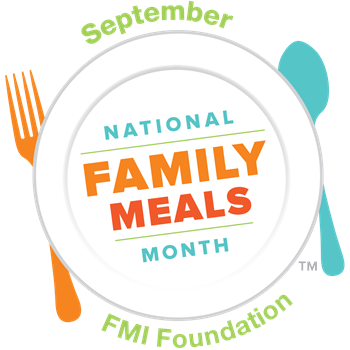<p>By: David Fikes, Executive Director, FMI Foundation</p><p><img src="https://www.fmi.org/images/default-source/family-meals/jpg-logo/nfmm-logo-color.tmb-large-350-.png?Culture=en&sfvrsn=b3d7ff65_2" style="float:right;margin:10px;" class="-align-right" alt="nfmm-logo-color" sf-size="265711" />In one of my favorite <em>Ted Lasso</em> episodes, Richmond’s director of operations, Leslie Higgins hosts the entire soccer team for a holiday feast. In his post-meal thank-you to the players, he names the home country of each team member and notes that likely they would have preferred to been home with their families on this occasion, but rounds out his toast with the poignant words, “to the family we’re born with, and to the family we make along the way.” However you define family – by birth or choice – there is strength in frequently dining with loved ones. </p><p>The tenth edition of <a href="https://www.fmi.org/family-meals">National Family Meals Month (NFMM)</a> is now in the history books and once again we have the benefit of Harris Poll research data to provide a rearview mirror glimpse of how successful we were at getting our family meals messaging out in the public eye.</p><p>Just shy of one-third (31%) of American consumers reported seeing NFMM messaging encouraging more frequent family meals during September. Survey participants with children in the household recorded an even higher rate of penetration with almost half (49%) reporting seeing NFFM messaging. </p><p>The most successful mediums engaged during the month-long campaign that contributed to our reach included social media (18%), television (16%), in-store displays (10%), advertising (9%), email/print direct marketing (8%), product packaging (7%) and supermarket websites (7%). </p><p>Perhaps the most impressive statistic emerging from the Harris Poll research was that of those who saw our messaging, an overwhelming 95% reported being inspired to take positive action making changes to their consumption and shopping habits. Those actions included:</p><ul><li>45% made healthier food choices, </li><li>44% cooked more at home, </li><li>40% said they purchased more fresh fruits and vegetables, </li><li>39% ate together as a family more often, </li><li>36% began meal planning and </li><li>33% tried some new recipes</li></ul><p>When asked to evaluate the benefits of family meals, survey participants registered all the right notes, identifying the rich diversity of advantages that family meals possess. Perhaps driven by some inflation weariness, nine out of ten consumers (91%) find family meals more economical than eating out, 84% report they strengthen the nation’s social fabric by helping families stay connected, 84% identify family meals as having positive mental health benefits and 83% find there are physical health benefits to family meals. </p><p>Interestingly, survey respondents who are college graduates appear to more readily recognize the economic, social, mental and physical benefits of family meals, with their scores being 2-4 percentage points higher than the average total in each of the benefit categories. </p><p>When asked to crystal ball gaze a bit and identify which benefits would likely inspire more frequent family meals in the upcoming year, respondents gave equally high marks to the social and mental advantages to family meals, but gave slightly higher motivation marks to the nutritional and physical benefits. Somewhat surprisingly given the current economic climate, the economical value of family meals rated significantly lower as a motivator for more frequent family meals. </p><p>Overall, most shoppers were grateful for the education, information and encouragement the NFMM campaign provided with 51% saying <em>it’s a good concept</em>, 41% finding it <em>informative</em>, 37% saying it <em>gave them some new ideas</em>, 32% saying it <em>inspired more time together as family</em> and 24% saying <em>they’ve put the ideas into practice.</em> On the more critical side of the equation, 22% said <em>they wish they had time to do it</em>, 20% reported it to be <em>impractical to their lifestyle</em>, 19% said it <em>matches what they are already doing</em> and only 15% said the NFMM campaign <em>didn’t tell them anything they didn’t already know.</em> </p><p>To our members who supported the 2024 edition of Family Meals Month with creative activations, we thank you for contributing to another outstanding effort encouraging the greatest answer to a happier, healthier society – the family meal. To celebrate our success, have dinner tonight with your family – however you define it. And plan to join us October 29 at 2 p.m. EST for the live podcast of the <a href="https://www.fmi.org/family-meals/award">Gold Plate Awards</a> when we recognize the top NFMM activations for 2024. </p><p><a href="https://www.fmi.org/family-meals-movement" class="button">Continue the Family Meals Movement</a></p>
[#item_full_content]




